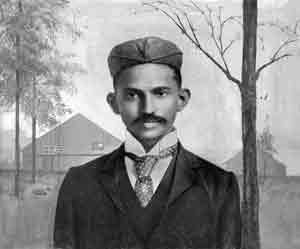 |
| GANDHI IN SOUTH AFRICA |
 |
| M.K. Gandhi while serving in the Ambulance Corps during the Boer War |
In South Africa, Gandhi faced the discrimination directed at Indians.
He was thrown off a train at Pietermaritzburg after refusing to move from the first class to a third-class coach while holding a valid first-class ticket.
Travelling farther on by stagecoach he was beaten by a driver for refusing to travel on the foot board to make room for a European passenger.
He suffered other hardships on the journey as well, including being barred from several hotels. In another incident, the magistrate of a Durban court ordered Gandhi to remove his turban, which he refused to do
These events were a turning point in his life, awakening him to social injustice and influencing his subsequent social activism.
It was through witnessing firsthand the racism, prejudice and injustice against Indians in South Africa that Gandhi started to question his people's status within the British Empire, and his own place in society.
Civil rights movement in South Africa has following points:
- Racism and controversy- Some of Gandhi's early South African articles are controversial. On 7 March 1908, Gandhi wrote in the Indian Opinion of his time in a South African prison: "Kaffirs are as a rule uncivilised—the convicts even more so
- Role in Zulu War of 1906- In 1906, after the British introduced a new poll-tax, Zulus in South Africa killed two British officers. In response, the British declared war against the Zulus. Gandhi actively encouraged the British to recruit Indians.
Nonetheless, they accepted Gandhi's offer to let a detachment of Indians volunteer as a stretcher-bearer corps to treat wounded British soldiers. This corps was commanded by Gandhi.
On 21 July 1906, Gandhi wrote in Indian Opinion: "The corps had been formed at the instance of the Natal Government by way of experiment, in connection with the operations against the Natives consists of twenty three Indians".
